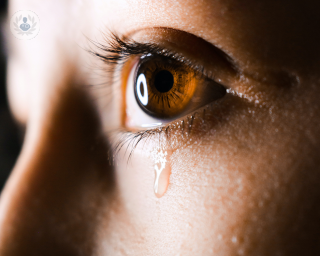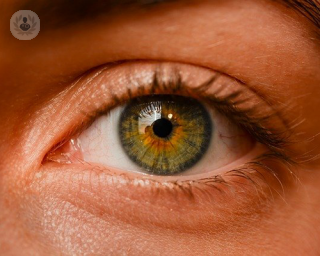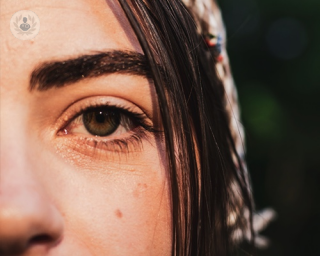Watery eyes
Mr Radwan Almousa - Ophthalmology
Created on: 07-17-2013
Updated on: 03-31-2023
Edited by: Conor Dunworth
What are watery eyes?
Watery eyes, also known as epiphora, is a condition where there is an overflow of tears onto the face. It is very common and can develop at any age, although it is more common in babies and people over the age of 60. It may affect one or both eyes and usually gets better without any treatment or, if need be, it can easily and effectively be treated.

What do watery eyes indicate?
There could be several reasons why you have watery eyes. Some of the most common causes of watery eyes are:
- Blocked tear ducts
Some people are born with underdeveloped tear ducts and it is normal for newborn babies to have watering eyes, which clear up as the ducts develop. In adults and older children, the most common cause is blocked ducts or ducts that are too narrow. Narrowed ducts are a result of swelling or inflammation. If the tear ducts are blocked, the tears will build-up and not be able to drain. The build-up of tears in the tear sac increases the risk of an infection, meaning the eye will produce a sticky liquid.
- Overproduction of tears
Eyes that become irritated may produce more tears than normal. The eyes can become irritated by a number of factors, including; some chemicals, such as fumes, infective or allergic conjunctivitis, an injury to the eyes, such as a scratch or from grit, from the eyelashes growing inward or to the lower eyelid turning outward.
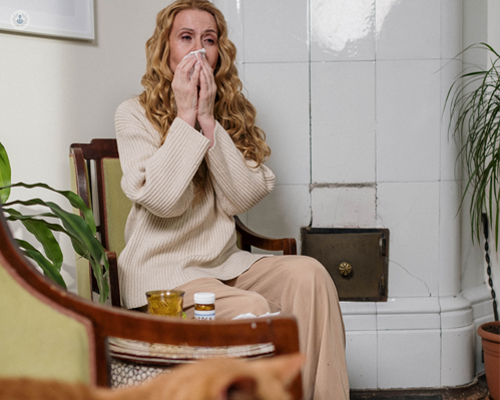
- Other causes
Watering eyes can result from an infection of the cornea (keratitis), an open sore on the front surface of the eye (corneal ulcer), styes or Bell’s palsy. Furthermore, dry eyes, allergies such as hay fever and the use of certain medications due to the preservatives as an ingredient can all cause watery eyes.
Why do I have itchy, watery eyes?
One of the causes of watery eyes are allergies. They can trigger the release of histamine, which causes blood vessels in the eye to dilate. This dilation irritates the nerve endings, so eyes start to water. Itchy, watery eyes can be triggered by allergens such as:
- Pollen;
- Animal fur;
- Mould:
- Dust mites;
- Make-up.
Other conditions such as allergic conjunctivitis, atopic keratoconjunctivitis and eczema can also cause itchy eyes.
Does glaucoma cause watery eyes?
A specific type of severe glaucoma called primary open angle-closure glaucoma can cause watery eyes. It happens when drainage of the clear liquid inside the front part of the eye (aqueous humour) is suddenly blocked. It can lead to a painful increase in eye pressure very quickly. Other angle-closure glaucoma symptoms can include:
- Decreased, or cloudy vision;
- Sudden total, or partial loss, of vision in the eye;
- Double vision;
- Seeing spots;
- Seeing haloes around lights;
- Nausea and vomiting alongside severe eye pain;
- Severe pain in, and/or around the eye;
- Severe headache.
How do you get rid of watery eyes?
In mild cases of watery eyes, the doctor may recommend dry eye drops and monitor progress.
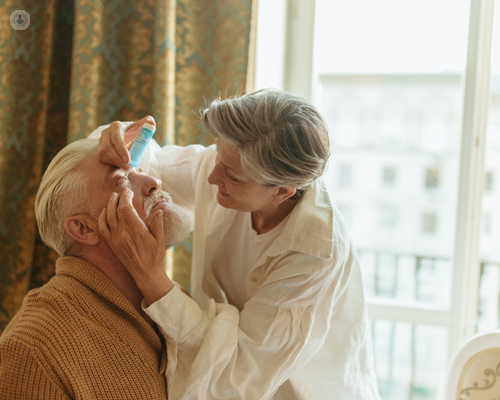
Depending on the cause of watery eyes, there are different treatment options. For watery eyes caused by an irritation, if it does not clear up by itself then lubricating eyedrops may be necessary. For blocked tear ducts, surgery may be required to create a new channel between the tear sacs to the inside of the nose. The surgical procedure is called dacryocystorhinostomy (DCR).
When should you see a doctor for watery eyes?
If you have watery eyes and experience the following symptoms, you should seek medical attention:
- A sensation that there's a foreign body in your eye;
- Eye pain;
- Reduced vision.
You should make an appointment with your doctor if you have watery eyes, without the above symptoms, that are chronic.
Are there home remedies for watery eyes?
It is recommended to take a break from reading, computer or phone screens. Most dry eye drops are available to purchase over the counter at a pharmacy to keep the eyes lubricated.
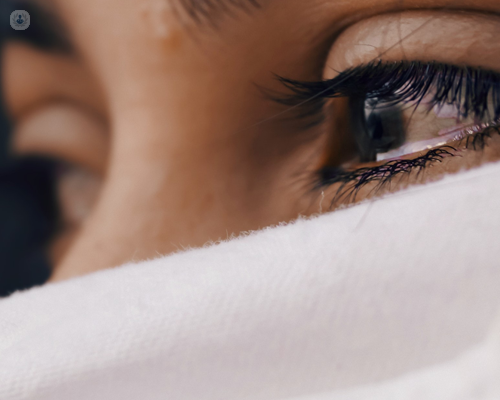
Holding a warm, damp cloth over the eyes may help to release any blockages also. Cleansing the eyelids with lid wipes or a saline solution can also help alleviate symptoms of dry eyes if linked with blepharitis.
What specialist treats watery eyes?
An ophthalmologist can examine your eyes after you've been referred by your GP or optician. This happens if your symptoms require complex treatment or there's no obvious reason for watery eyes.

